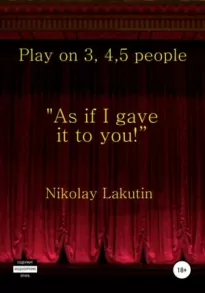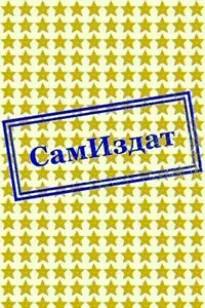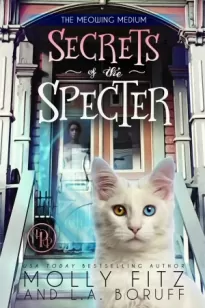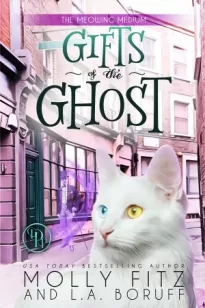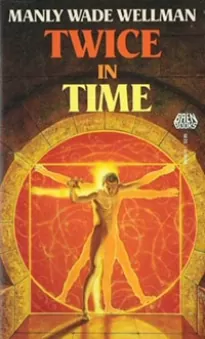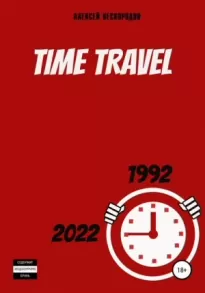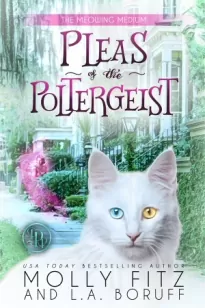Struggle. Prisoners of Darkness
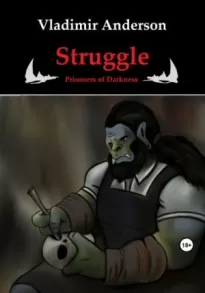
- Автор: Владимир Андерсон
- Жанр: Боевая фантастика / Боевик / Героическая фантастика
- Дата выхода: 2023
Читать книгу "Struggle. Prisoners of Darkness" полностью
The happiest man on Earth
The white endless steppe. Sun and rays on the snow.
Alexander Rucheyov was making his way forward. All his thoughts and sensations had disappeared somewhere.
Only an unknown force was moving him forward.
Behind one of the steppe dunes there was a road — Nikopol was already close.
The rebel got out onto the road and ran down it. It was easier, but he still had no strength. There was no strength, no thoughts, just forward motion. He lost his bearings again and sank into himself, while his legs were tirelessly tearing toward immortality.
He remembered how he and Vladimir had run along a similar path, practicing for the next crossing. Vladimir had said then that when the war was over, he would finally have enough time to find his soulmate. They would have many children who had not seen war. He dreamed of having a cottage near the Pechenezh reservoir, not far from where one of his ancestors had died in the Ancient War. He would tell his children how he himself had fought, how others had fought, how many friends and relatives had died; that no matter how much he searched, he could not find a place where there was no war, and also that there would never be war again if everyone wanted it that way, and after that it would be so — and his children would never fight… Then Alexander asked him what he would do if he did not live to see the end of the war.
Vladimir replied that then his children would dream about all this, and when they lived to the end of the war, they would tell their children how their grandfather and great-grandfather had fought, and that there was no place on earth where there was no war.
Alexander's heart ached, because Vladimir was dead, and he had no children or wife, so there would be no one to tell about how his grandfather, and great-grandfather, and … And Vladimir will remain a soldier whose name is known, but no one needs.
"No!" Alexander shouted in his mind and ran even faster. — If I get there, there will be legends about him, he will be cited as an example, he will be needed, he will be History."
The stomping of hoofs was heard, already strong and close. In a moment two riders appeared, white horses and men like them. The face of the rebel remained unknown, but his soul smiled.
Some fifteen seconds later, they were one step away from each other.
"Buddy, are you far away?" — asked the first of them, the one with the redder nose and wider eyes. Alexander was glad that he had accomplished his task.
"Khmelnitsky's group. Red Gull," Alexander replied. The last words, in the most "extraordinary" language, meant that he had an urgent package.
Despite the emergency their facial expressions haven't changed a bit — so cheerful and upbeat. "Ha-Ha," said the other.
"All right, pops, sit down, we'll get you there in a jiffy," nodded the first. "Cossacks," Alexander deduced, climbing onto the horse.
We got there in no time at all and even with a breeze.
Nikolai Krovin-Kutuzov, commander of the Nikopol group, was familiar with Rucheyov, and was waiting at the very edge of the city as if on purpose.
Alexander got off his horse and took two steps forward, but he couldn't go any further, his legs had no feeling.
Nikolai came up and hugged him — once they had both been in the same battle bundle.
"What's up?" — He asked, but felt the heat radiating from Alexander. His red and slightly swollen hands didn't move or even shake, and they weren't even bleeding.
"The letter is in your right pocket, buddy…" — replied the rebel and started to fall, but was immediately caught by the commander. Alexander couldn't feel his legs, arms, stomach, back — he couldn't feel anything at all, only his eyelids, occasionally blinking in front of his eyes. Before, the whole body stabbed, then vaulted, clenched, threw him into a daze and here was nothing. But it felt good in a way it never had before.
Alexander looked up — there was no Heaven. Light was spreading from somewhere far away.
"Sanya! Sanya!" — the commander shook Rucheyev, but there was no answer — the rebel had perished: he had frozen to death.
"You will not be forgotten," Krovin-Kutuzov said and instructed him to find a good burial place. A moment later, the commander opened the envelope:
"From Viktor Khmelnitsky to Nikolai Krovin-Kutuzov, commander of the group.
I order to mine the routes from Donetsk-Makeyevka to Dnepropetrovsk. Not by the evening of March 29. On the way to Dnepropetrovsk, a column will move along them. Presumably from three to five drills. Perhaps SCK. As the most suitable place to use the site Vasilkovkivka-Pisamennoe, near the river Volchya.
Replace the mine site if necessary, but everything should be ready by 8 p.m. March 29.
Act as cautiously as possible, possibly declaring a state of emergency while guarding transportation routes.
First degree of importance.
Viktor Khmelnitsky."
What must not be allowed to happen.
When the plagues learned that ten of them were lying dead in the cave, they did not believe it. They laughed at Nicholas. But he bowed to them as their masters, asked for help in "repelling the next attack," showed the blood on his hands. And they did not believe him. Only one very young, not yet quite inhuman chum Dunhr decided to check it out.
Then they began to laugh at him too. But he followed the man, with him and his two friends in case the Maquis attacked.
The sight of the cave did not disconcert Dunhir at all. He did not yet know that plagues rarely killed on any occasion. It seemed to him that it was not an uncommon event, that war, though fought only with Maquis, was still fought, and that there were casualties.
When he returned to Donetsk-Makeyevka, there was no surprise or fear on his face, so no one believed his words about what had happened either. But his friends brought Yognhra's body.
Then everyone shuddered: somewhere at the sight of the face of the chief of the SSchekists, contorted by unknown fear, panic began.
Almost two-thirds of the entire staff was sent to the cave: three SCK drills and one Black Stone drill. With them went Ananhr's deputy Chum brother Shinhr.
The first thing they wanted to do was to kill the six surviving miners. But they bowed to them as masters and apologized for not being able to save their masters from death; Hora said that dead miners could not work, and he would very much like to apologize and the next day double the production rate.
Shinhra had special instructions to bring at least one man alive, but seeing such obedience, he could not order the others to be destroyed — an unwritten law: if he recommended a "lucky" man to the top, they could then promote him themselves.
Everyone was returned to Donetsk-Makeyevka.
"Viktor," the Dictator said, addressing the commander of the Bulgarian soma. The latter did not notice the petrification of his interlocutor and the fact that molten steel flowed in his veins instead of blood. "Yes, yes, my friend," Valikov replied.
"My friend"… How much meaning can be invested by people who are ready to gnaw at any convenient moment. "My friend" is an address that shows a heartfelt attitude, but it is mostly used to deceive.
"Buddy, tomorrow we'll be ready…" — At another time Gavriil would have laughed at this phrase — how could one be unprepared for anything under such a regime — but now he did not, because now he was not the Commander, he was the Dictator. A dictator can't be happy about anything, he must always be clenched into a fist, so that, in case of anything, he could press everyone, so that they would obey him.
Valikov did not seem to see in Gavriil a far-sighted man, capable of acting in a roundabout way — to walk not on the road, but beside it. It seemed to him that such a commander could be persuaded of anything, as long as it was based on "good purposes" and a "desire to help" his subordinates. He did not yet know what such an opinion would cost him.
"Georgy," Gavriil addressed his relative now, though with a different surname. Volin reacted as brightly and sensitively as if he hadn't seen him in ten years: "Ohhh… How's life? Is it all right, or are the plagues making you break your third sweat again?…? You know, judging by your look, all the sweat has already been broken…"
It was the only person who detected the bottomless abyss in his eyes. It wasn't that he didn't like it, it just took away the liveliness of the action.
"Zhor… I have a favor to ask of you… Masha… She has to get out of here."
Roughly speaking Volin didn't understand these words — his left eyebrow rose to his forehead and his eyes froze in place: "Buddy, what are you doing? What the hell happened?"
"My son. — Gabriel almost whispered. — 'He's dead… Please don't tell her that. She will kill herself… Zhora… your daughter is already a widow… My son is already gone… Zhora… Masha will have a child… She must run away."
Georgi bowed his head and placed a hand on Gabriel's shoulder: "Raphael is dead…" He sighed heavily and bent down altogether. He felt sick to his stomach — Masha would really kill herself if she found out. Volin couldn't even imagine what would happen to her. Her heart would simply stop.
"So it's today?" — The daughter's father asked. The son's father nodded silently. 'Tomorrow will be too late.
Today, March 29, is a very special day. Tonight, at exactly nine o'clock in the evening, the plagues take everyone outside, to the surface, for half an hour.
"Masha," the father called out to his daughter. Everyone was walking around peacefully, breathing the fresh air.
The area where the miners could walk was next to the railroad and was fenced off both from it and from the rest of the world by a barbed wire fence. At three corners stood wooden towers occupied by chums once a week. The fourth corner was connected through a gate to the main outer building of the Donetsk-Makeyevka group.
Maria Zheleznova, meanwhile, flashed her eyes randomly through the crowd in search of her husband. When she heard her father's voice, she assumed he had found him and immediately ran up: "What?"
Wolin looked darker than a cloud, "Mash…"
"Dad, what did you want to say? Have you seen Raphael?"
Georgie had never in his life lied to her strong and kind eyes, but now there was no other choice — he would have to, seeing her for the last time in his life, lie to her.
His head instinctively turned to the side, but his mouth refused to speak. Wolin felt that if he acted like this, it would be implausible, and nothing would come of it.
He turned his head and looked into her eyes. Kind, pure, happy eyes. "How happy she is. It's from her husband. She sees her happiness in him… She doesn't know he's no longer alive."
"Masha. We don't have much time… Memorize what I say…" — Volin began. "Dad. Is something wrong with Raphael?"
Those words didn't stick in his throat, he was determined not to stop, "Listen to me… Do you know where the Maquis stash is around here?"
Maria nodded, not yet realizing what she was being offered.
"Here. There's plenty of room for you. Everything's already been put in there. Food, clothes, there's a map and compass in there. In seven minutes we'll get there… the guys will distract them just in case…"
"Dad, do you want me to run away?"
"You need to do this. You're pregnant. Poppy will meet…"
"No. I won't do that. I'll stay with my husband. — Maria turned away, frowned, and clamped her lips shut. — I'll stay with Raphael."
Now that his daughter wasn't looking at him, the father had the opportunity to lie more skillfully, "And who's separating you from him. He's running away with you. Not for another week. We can't have two people running away at once. I promise he'll join you later."
Maria quickly turned back around, her face filled with hope, "Really? Promise?"
Masha looked straight into his eyes, and she knew how to see the truth. Georgy knew that, and also that everything depended on that answer. He was sweating everywhere except his face, because he couldn't sweat there, and for a split second a whole column of different thoughts ran through his mind: "If I'm wrong, she'll learn a truth she can't bear. She can't imagine herself without her husband. She'll kill herself. No. You don't just say yes. I have to say it like it's living inside of me. It must feel good to say it… God help me."
"Yes."
It was a word Maria felt in her soul: two letters merged into a word to save lives. It was the word Maria longed to hear now. It was the word that lifted a mountain off her shoulders.
"Thanks, Dad," she hugged him and closed her eyes. — Thank you."
The hiding place is dark and even a little damp. The ground is cold and hard as stone. Maria sat there with her knees to her face, her height preventing her from lifting her head. She was covered by a wooden plank covered with earth and trampled snow. But at least she could breathe well: not that there was any real ventilation, but it was different from the mine.
In order not to risk penetrating the cache, the miners made a real spectacle: Gora ordered Lesin to fight with Mr.
Stolov. The very man who, like Ptitsev, doubted the Dictator. He had come to his senses in time, but there was still the fact of untimely obedience: he had obeyed, but not at once. For this he should have been punished, though not as severely as Ptitsev, but in front of everyone.
Nicholas then came at him with such a rage and a cry of "How dare you!" that one would have thought it was a deeply personal matter. They were soon separated, and began to see what was the matter; of course, the plague. As luck would have it, at that moment Dunhyr was on duty at one of the towers, and he had personally seen Lesin kneeling on his knees that morning, saying, "Master, I am sorry." Thanks to this, the decision was not long in coming: Stolov was transferred to a black miner, Nikolai was made an example to everyone as a model of a "servant of the Empire" and was given a can of canned food (which he himself did not touch later — he gave it to others). It was hard for him then to stand in front of everyone and under these words, he thought that he would be hated for it, but it lasted only until the next day, when everyone realized what had happened.
Maria did not know all this. When the plagues "praised" Lesin, she heard some very indistinct words and a muffled boom — her father and father-in-law were standing over the hiding place, stomping on the snow. Volin especially did not want her to know the price of her freedom, so that she would not have to pay it again: she had to escape quickly and unnoticed.
Now it's time to get out of this crumbling pit — enough has passed.
Maria rested her hands on the plank and, sitting on her knees, began to push upward. The blood rushed up her legs, and everywhere stabbed. There was this strange sensation of nerves coming alive; when oxygen reaches them, they "shout" it to the whole body.
After a little effort, the lid lifted and moved a little to the side: snow and small dim rays of light fell in chunks from outside. Volin had given his daughter an old Vostok watch, but it was only possible to look at the light. There wasn't much of it, but the dial flickered an acrid green color: "10:33."
Maria was slightly surprised that she had managed to be unmoved for so long: something, but it was something she disliked doing to the core of her being.
The urge to get out was even stronger, and with the next impulse of will, the lid pulled away from the exit completely. Poking her head out to the surface. Maria felt the cool, fresh air everywhere around her, and the fact that no one was around. She'd never been alone in her life, and her father was gone, and he was almost always with her.
She pulled out a dark green bag wrapped in white cloth, and immediately touched the still wet but rapidly freezing snow. By now the sun had disappeared over the horizon, only illuminating the all-powerful sky, occasionally covered with puffy clouds: the wind had blown in from several directions at once, and the cold had taken on a new, nocturnal appearance.
Maria looked around: there were no plagues or people. "Gotta go. — She whispered to herself. — Go.
The work was quite successful: joint efforts produced 76 tons of coal, i.e. an average of 19 per catfish. No one was stoned, but in Sector 2 (counting) the commanders were warned that the next day there should be at least 80.
Gabriel had a chance to think things over this evening without feeling the deafening and continuous pain in his back. "So, Sun Tzu again. — Gabriel thought. — "Therefore, if I show the opponent some form, and I myself do not have this
form, I will preserve wholeness, and the opponent will be divided into parts." And people who are constantly working have no form, because they have no home, they have the Native Land, they have no political association, they have the common idea of Being Free. Sun Tzu's lack of form does not mean that it does not really exist — it does not exist for the enemy.
Further. "The enemy does not know where he will fight. And since he does not know it, he has many places where he must be ready. If there are many places where he must be ready, those who fight with me are few", Actually, this is the factor of division of the enemy. The plagues are present where we submit to them, where we work for them. But even in such places, they don't look in every nook and cranny, they don't watch everyone, and they don't suspect everyone. This is their greatest weakness. They think that if they have won once, they will not have to win the second time, because they have already been defeated. This factor can be perfectly realized through Tikhomirov. They do not know how to be patient for long — they will test him a couple of times and leave him. And he knows how to hide his feelings. Good… Sun-Tzu: "Therefore, if you know the place of battle and the day of battle, you can attack and a thousand zhang. If you don't know the place of battle, you don't know the day of battle, you can't protect the left side with the left side, you can't protect the right side with the right side…" This is probably my biggest advantage. I set the place of attack and its timing. And they can't attack, they just don't know who to attack. And when they do, they have to defend.
Gabriel thought that this was the end of the chapter on "Fullness and Emptiness". By now everyone, or almost everyone, should have fallen asleep. It was a good time to talk to those who had access to the surface.
Tikhomirov, due to his status, slept closer to the exit, and next to the Dictator. When Hora patted him with his palm, it turned out that Ivan was still awake, too.
"Can't sleep, can you, Vanya?" — Gavriil asked quietly.
"It's a dog's job. How can you sleep here?" — so harsh and critical words flew out of Tikhomirov's mouth inadequately calmly, he was, indeed, in complete control of his emotions, so that, if necessary, he could say "Plagues, rotting beasts, I wish you were dead" with such love that no one who did not speak Russian would have understood what he was talking about and what his attitude was.
"Your work is needed. A lot depends on you. You know that," the Dictator affirmed almost as warmly as the Commander would have done before.
